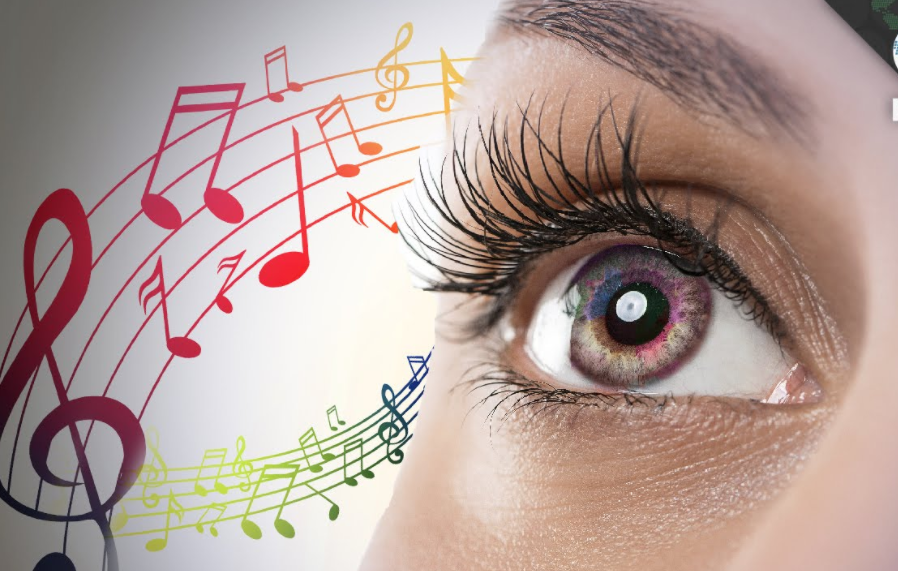Have you ever tasted the color yellow? Or does your favorite poem evoke a distinctive smell?
你嘗過黃色的味道嗎?或者你最喜歡的詩會散發特有的氣味嗎?
Then you, my friend, may have synesthesia.
那么你,我的朋友,可能有聯覺。
Synesthesia is an automatic linking of senses, where stimulation of one sense causes you to perceive another.
聯覺是感覺的一種自動連接,通過刺激一種感覺會讓人感知另一種感覺。
Someone with sound-color synesthesia, for example, might hear their favorite song and think,
例如,一個有聲音——顏色聯覺的人,聽到最喜歡的歌可能會想到,
"The greens and reds in that chorus, man! Let me tell ya…"
“那合唱里的綠色和紅色,伙計!讓我告訴你……”
It's basically a weird brain superpower on its own.
它本身就是一個奇怪的超級大腦。
And, turns out, people with synesthesia might even have a slightly better memory when it comes to certain things.
事實證明,有聯覺的人在某些事情的記憶上甚至可能更好。
About 2 to 4 percent of people have at least one subtype of synesthesia.
2%到4%左右的人至少有一種亞型聯覺。
Some might see colors in songs, while others taste numbers.
一些人可能會在歌曲中看到顏色,而另一些人可能會嘗到數字的味道。
Someone could even perceive time as a sort of spatial calendar that wraps around them.
有人甚至可以將時間視為一種四周圍繞的空間日歷。
A synesthetic brain makes these associations between senses while you're already using one of them.
當使用其中一種感官時,聯覺大腦會在這些感官之間產生這些聯系。
So it's not the same as a hallucination, like hearing voices without any sort of stimulus.
所以它與幻覺不同,就像聽到沒有刺激的聲音一樣。
A 2011 review of the literature suggests that some people are genetically predisposed towards developing a subtype of synesthesia,
2011年的一篇文獻綜述表明, 某些人有亞型聯覺的遺傳傾向,
thanks to the way their brains develop. The exact processes and brain areas responsible for synesthesia are still under debate,
這得感謝他們大腦發育的方式。有關聯覺的確切過程和大腦區域仍存在爭議,
but we do know that synesthetic brains show more connectivity.
但我們知道聯覺大腦顯示出更多的連通性。
Your brain has chunks of of gray matter, which is mostly neuron cell bodies and other brain cells,
大腦有大量的灰質,這些灰質大部分是神經元細胞和其他腦細胞,
and white matter tracts, which are like the wire parts of neurons that carry information between more distant brain regions.
白質束就像神經元的電線一樣,在更遠的大腦區域之間傳遞信息。
Those white matter tracts tend to be more developed in synesthetes, especially between sensory areas.
聯覺人的白質束往往更發達,尤其是在各個感區之間。
Many researchers think this could be because of a failure in a developmental process called synaptic pruning.
許多研究人員認為這可能是由于突觸剪枝發育過程出現故障。
Synaptic pruning is pretty much what it sounds like. Imagine your brain taking a pair of gardening shears to the cell connections
突觸剪枝就是字面上的意思,想象大腦拿著一把園藝剪刀去連接細胞,
that are aren't really needed to keep everything working.
人們并不需要這些細胞來維持正常工作
Typically, as you grow up, some white matter connections get pruned back and honed into certain paths.
通常,隨著人長大,一些白質連接會被修剪并打磨成特定的路徑。
Your brain is trying to optimize efficiency and get rid of connections that you don't use to save energy.
你的大腦正試圖優化效率,除掉那些不被用來儲存能量的連接。
It's possible that in synesthesia, this pruning doesn't happen as effectively.
在連感中,這種修剪并不會發生
This could leave all sorts of unexpected connections between brain cells intact.
可能會使腦細胞之間各種意想不到的連接保持完整。
And as a result, the sensory regions of your brain may mingle with each other more than they should.
因此,大腦的感覺區域可能會盡可能相互干擾。
Another hypothesis has to do with how your brain regulates when and how your neurons talk to each other.

另一個假設與大腦調節神經元何時以及如何相互交流的方式有關。
In people without synesthesia, when you perceive something with one sense,
沒有聯覺的人用一種感覺感知事物時,
you just perceive that sense because neurons leading to other sensory regions are inhibited with some sort of chemical or physical barrier.
只是感知到感覺,因為通向其他感覺區域的神經元受到某種化學或物理障礙的抑制。
And in synesthetic brains, those kinds of barriers might not function as well or in the same ways.
在聯覺大腦中,這些障礙可能不會起作用或者以相同的方式起作用。
So certain kinds of stimulation might leak over into other sensory pathways,
某些刺激可能會滲透至其他感覺路徑,
like activating smell which should have no business in perceiving the song you're listening to.
就像激活的氣味一樣,無法察覺你正在聽的歌。
But all this talk of 'failure of certain processes and systems' almost makes it seem like synesthesia is an illness, but that's not the case!
但是所有這些關于“某些流程和系統故障”的討論幾乎讓人認為聯覺是一種病,但事實并非如此!
Some people have even noticed that certain synesthetic associations can help them perform better on memory tests.
有些人甚至注意到某些聯覺聯系可以幫助他們在記憶測試中表現得更好。
In 2013, researchers conducted a memory experiment with a group of 28 color-letter synesthetes and 35 control subjects.
2013年,研究人員對一組28名顏色—字母聯覺者和35個對照組進行了記憶實驗。
First, they showed the participants a bunch of words, landscape pictures, and fractal patterns.
首先,他們向參與者展示了一些單詞、風景畫和分形圖。
Then, the researchers showed pairs of things the subjects had seen before and similar-looking words and images,
然后,研究人員向受試者展示了他們過去見過的成對的事物以及類似的詞語和圖像,
and had people pick the one they recognize. Like, a pair of words would be: FISH and FIST.
讓其選擇認識的,就像,一組單詞:魚和拳頭。
They found that the color-letter synesthetes were significantly better at remembering things in all of these categories than the control group.
他們發現,其中,顏色—字母聯覺者明顯比對照組更善于記住事物。
However, when the same experiment was run with a group of 18 word-taste synesthetes and 18 control subjects,
然而,他們在18名單詞—味覺聯覺者和18個對照組進行了同樣的實驗,
the data showed that the synesthetic people didn't have a statistically significant advantage over the control group.
數據顯示,具有聯覺能力的人并不比對照組有明顯優勢。
Other small studies have had similarly mixed results.
同樣,其他小型研究結果也不同。
This makes it hard to tell whether just having synesthesia gives you memory boost because memory also has to do with making connections in the brain,
這使得我們很難判斷僅僅有聯覺是否會增強記憶,因為記憶也與大腦的連接有關,
or whether certain subtypes of synesthesia can help with certain tests.
或者某些亞型聯覺是否有助于某些測試。
Some scientists think the memory advantage depends on whether the thing you're trying to remember
一些科學家認為,記憶優勢取決于你想要記住的東西
is going through similar sensory paths in your brain as your synesthesia.
是否經歷了大腦中與聯覺相似的感覺路徑。
These researchers, for instance, concluded that the color-letter synesthetes likely had more activity in the visual brain regions,
這些研究人員得出的結論是,顏色—字母聯覺者的視覺大腦區域可能更活躍,
which could let them process and remember visual information—both images and words—better.
使得他們可以更好地處理和記憶視覺信息——包括圖像和單詞。
So if you find songs to be literally tasty jams, or think that the alphabet looks like a giant rainbow,
所以,如果你覺得歌曲簡直就是美味的果醬,或者認為字母表看起來像一條長長的彩虹,
you might have a bit of an edge on the rest of us when it comes to memory.
在記憶力方面,你可能比其余的人更強。
Use your powers for good! Thanks for watching this episode of SciShow Psych, brought to you by our wonderful patrons on Patreon!
善用你的優勢!感謝收看本集心理科學秀!本集節目由Patreon贊助!
If you'd like to support all the SciShow channels, you can go to patreon.com/scishow.
如果你想收看所有頻道,可以訪問patreon.com/scishow。
And if you want to keep exploring weird brain things with us, go to youtube.com/scishowpsych and subscribe.
如果你想和我們一起探索更多的大腦怪事,訂閱youtube.com/scishowpsych。











